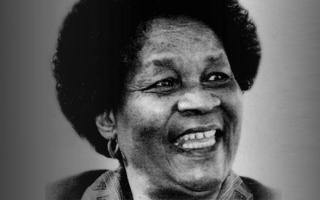
PHOTO CAPTION. Albertina Sisulu. She had a leadership role in the Federation of South African Women.
The concept of feminism is often misunderstood and associated with women who bear sentiments of anger towards men. Feminism is also often associated with false stereotypes, such as “Feminists hate men”, “Feminists are angry”, “All feminists are career women and do not support stay-at-home moms” and so on.
This is far from the truth and in essence, feminism is not about placing one gender above the other, but rather about equalising the playing field so that all genders are treated equally and are able to exercise their rights equally. This is in line with everyone's human right to be treated equally before the law under section 9 of the Constitution.
South Africa celebrates National Women's Day on the 9th of August every year, which marks the successful march of women from various racial, ethnic and class backgrounds against the pass laws during the apartheid years. This march displayed the power of women to publicly make their voices heard on matters they considered important to them. This is a good example of how feminism in South Africa can lead to changes in the law.
Most legal feminists in South Africa began their journey with feminist politics after becoming aware of the laws that discriminated against women. Legislation relating to women's issues such as violence against women and decisions regarding abortions are just a few examples which illustrate the successes of feminists that worked to enhance the position and changing the legal standing of women in the South African society.
Legal feminist activism emerged in Africa in the late 1980s with the emergence of various organisations, such as Women and the Law in Southern Africa, Women and the Law in Eastern Africa, Women and the Law in West Africa and Women Living Under Muslim Laws. In 1998, the African Women Lawyers Association, a group of African women lawyers, was formed to strengthen networking between women lawyers in the region with a common goal to promote gender equality.
Key feminists in South Africa
There are far too many South African feminists to mention, but the four women mentioned below were early feminists and their efforts resounds in our past, present and future.
Winnie Madikizela-Mandela is one of the most well-known feminists in South Africa. She was imprisoned numerous times by the apartheid police, banned, isolated and tried for treason, however, she remained persistent in her commitment to South Africa's liberation and the advancement of women's rights.
Lillian Ngoyi was the first woman ever to be elected to the ANC's executive and she was one of the organisers of the march against pass laws during the apartheid years on 9 August 1956. She also travelled to Switzerland to gain international support for the struggle and the emancipation of women at the World Congress of Mothers organised by the Women's International Democratic Federation.
Helen Suzman took an anti-apartheid stance and represented the United Party in Parliament. She later formed the Progressive Party and was well known for her criticisms against the apartheid policies.
Albertina Sisulu, also known as the “Mother of the Nation” was a political activist and nurse. She can also be considered as one of the most important leaders of the anti-apartheid struggle in South Africa. She had a leadership role in both the ANC and the Federation of South African Women, and was also one of the organisers of the march against pass laws during the apartheid years on 9 August 1956.
Change of old discriminatory laws a form of feminism
Recently, a woman took on discriminatory laws that created a default position that black couples who were married in terms of the old Black Administration Act, were automatically married out of community of property. This meant that black women married before 1988 did not receive the same protection as other married women in South Africa. On 14 April 2021, the Constitutional Court declared these discriminatory provisions unlawful, which means that all marriages entered under the Black Administration Act before 1988 are now considered to be in community of property.
This case highlights the impact one woman can have on changing the law and enhancing the position of women in South Africa. In the current wave of feminism, black women's negotiations of human rights are a delicate balancing act between personal needs and the needs of the community. However, as we evolve as a society, women of all races are realising that they are all working towards a common goal of fairness and equality.
Feminists continue to play a significant role in the advancement of rights for all genders and races. They strive for equality and work towards building South Africa to the great nation we aspire to become.
Did you know… National Women's Day marks the successful march of women from various racial, ethnic and class backgrounds against the pass laws during the apartheid years.